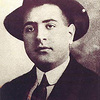João de Melo
Autor/a de Gente feliz com lágrimas
Sobre l'autor
Crèdit de la imatge: Por Jorgepchc - Obra do próprio, CC BY-SA 4.0, https://commons.wikimedia.org/w/index.php?curid=63735958
Obres de João de Melo
Os anos da guerra (1961-1975) - Os portugueses em África - Crónica, ficção e historia (1988) 7 exemplars
Histórias da resistência 1 exemplars
O Cão dos Olhos Dourados 1 exemplars
Gente feliz com lágrimas : romance 1 exemplars
" Toda e Qualquer Escrita" 1 exemplars
Gente Feliz com Lãgrimas 1 exemplars
Os Anos da Guerra 1 exemplars
Açores, o Segredo das Ilhas 1 exemplars
Poesia: Auto-Retrato. Prosa: The Serial Killer 1 exemplars
Os Anos da Guerra - 1961-1975 - Os Portugueses em África - Crónica, Ficção e História - Vol I 1 exemplars
Obres associades
Etiquetat
Coneixement comú
- Data de naixement
- 1949
- Gènere
- male
- Nacionalitat
- Portugal
- Lloc de naixement
- Azores, Portugal
- Llocs de residència
- Madrid, Spain
Membres
Ressenyes
Premis
Potser també t'agrada
Autors associats
Estadístiques
- Obres
- 31
- També de
- 1
- Membres
- 183
- Popularitat
- #118,259
- Valoració
- 4.0
- Ressenyes
- 3
- ISBN
- 41
- Llengües
- 5













